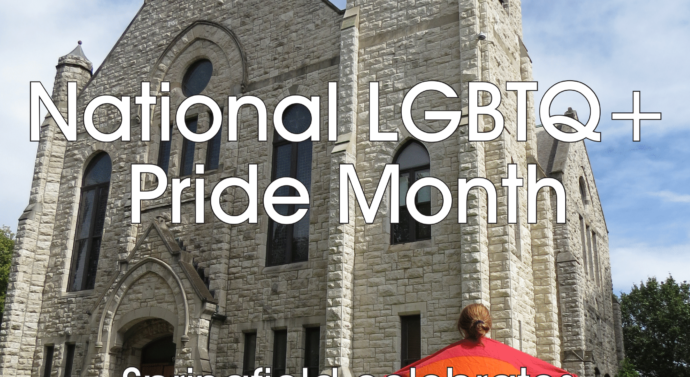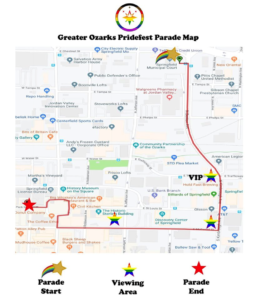
October: LGBTQ+ History Month
Front Page October 11, 2019, Comments Off 135It’s October, and that means it’s LGBTQ+ History Month. Our state’s tradition of celebrating LGBTQ+ history goes back to the 1990s when a Missouri high school teacher gathered school and community leaders to educate people about LGBTQ+ issues. For so many people, pride is a massive part of their life. But it wasn’t (and still isn’t) always accepted by some individuals and groups.
Why Pride is important
There are many reasons why Pride is so important for so many people.
Krista Moncado is the executive director of the Glo Center, a Springfield organization dedicated to cultivating LGBTQ-friendly safe spaces, promoting meaningful dialogue within the community, and providing mental health and other support services to LGBTQ+ youth.
“Having pride in who you are and your authentic self means accepting yourself and who you are,” she said. “The world benefits so much by having so many different unique perspectives, and LGBTQ+ people absolutely deserve to understand that their experiences are important.”
“Pride is important to me because it is a part of who I am. I can openly celebrate myself and my community for who I truly am!” said Emily Schulze, a Drury junior, in a Facebook comment about pride.
“Being LGBTQ+ isn’t something to accept or tolerate, it’s who you are,” Moncado continued. “We need to celebrate our differences and diversity… it’s a positive thing to be gay or trans, not negative. It adds value to the world when you can truly and freely be yourself.”
History of LGBTQ+ rights and issues
The first massive event in the LGBTQ+ civil rights movement was the Stonewall riots in New York City in 1969. In the early to mid-60s, it was illegal to serve alcohol to anyone suspected of being gay, according to History.com. While this regulation was overturned in 1966, gay bars were still raided by police frequently.
Gay bars in this area of New York were almost exclusively owned by the mafia and therefore would not have liquor licenses. This gave officers at the time enough reason to acquire warrants and force entry into gay safe spaces. Public acts of homosexuality were still illegal, even in New York. The police officers would then arrest anyone caught holding hands, kissing, dancing, etc. with someone of the same sex.
On one such raid at Stonewall Inn, one of the mob-controlled gay bars, patrons and neighbors were fed up with their poor treatment. Drury Allies Vice President Michael Havens emphasized, “They were tired of laying down and accepting it, like ‘dammit I’m not going to take it anymore.’”
An officer, while arresting a lesbian, hit her in the head, causing the people standing nearby who were already agitated to begin attacking the police. Soon, the raid had become a full-blown riot that lasted for six days.
“The Stonewall riots were a response to police brutality,” Moncado agreed, “but they were more than that. It was people saying ‘We’re not ashamed of who we are.’ For the first time, LGBTQ+ people started standing up for themselves in a real, organized way.”
By 1979, the LGBTQ+ movement had moved beyond their local focus to attempting national awareness and legislation. On Oct.14, the first walk on Washington for lesbian and gay rights took place. According to the National LGBT Chamber of Commerce, an estimated 200,000 people took part in the protest.
The AIDS epidemic in the ‘80s was tragic for the gay community and movement. The crisis was as terrible as it was because in large part, the government refused to do anything. Havens said, “[Ronald Regan] basically ignored it… it didn’t exist in his eyes.”
It was easy for political leaders of the time, especially on the right, to waive aside the concerns with the argument that the epidemic was just punishment. Pat Buchanan wrote in a New York Post editorial in 1984, “The poor homosexuals–they have declared war on nature, and now nature is exacting an awful retribution.”
Thankfully, homophobia is slowly decreasing in acceptance in the U.S. Few would likely echo Buchanan’s opinion today. Havens noted, “It’s really important to acknowledge the international presence of celebrity endorsements.” The growing acceptance of gay public figures like Ellen Degeneres and allies like Oprah Winfrey helped to nurture an attitude of acceptance.
What can you do now?
To get involved with the gay civil rights movement, Havens recommends “get[ting] involved with your local LGBTQ+ organization.” For Missoruians, he specifically recommends PROMO, a group advocating for queer equality in the state. Every Sunday PROMO has a phone bank where community members and allies “call voters and share our stories… to do some prejudice reduction.”
You can also contact government officials about the Missouri Nondiscrimination Act (MONA). The bill prevents businesses from discriminating in any way against race, religion and disability. This year, Missouri politicians are looking to update MONA to protect against discrimination over sexual orientation as well. Supporting this bill greatly helps Missouri LGBTQ+ people.
Pridefest is Saturday, Oct. 12 in Downtown Springfield

photo courtesy of the Glo Center
As part of the celebration of the history of the LGBTQ+ community, the annual Ozarks Pridefest will be held in downtown Springfield on Saturday, Oct. 12, from 10:30 a.m. until late Saturday evening. Festivities begin with a parade at 10:30 Saturday morning, which starts on Benton Avenue and Chestnut Expressway. The parade will move South on Benton, past Hold Fast Brewing, a VIP viewing area. VIPs will have a shady viewing area at Hold Fast Viewing for a $5 cover, according to Moncado.
Moncado and the Glo Center are heavily involved in coordinating Pridefest with the help of Springfield’s Pride Committee.
The parade will take a right onto McDaniel Street and make its way further downtown until it terminates at Park Central Square.
“There are going to be tons of things to do at the square,” said Moncado. “Local artists will be performing, we have a huge variety of booths and vendors, and we will even feature a drag queen storytime!”
Moncado stressed the importance of sponsorships for the event. “We worked really hard to find sponsors so that we could keep the event free to the public,” she said. “The idea is to include the entire community and build an atmosphere of not only tolerance but of friendship.”
Of the artists performing at Park Central Square, the headliner event is Steve Grand at 7:00 p.m. Grand is an openly gay singer-songwriter from Chicago. His career boasts over 18 million YouTube views, a #3 and #10 album on The Billboard Independent Album charts and his own record label, Grand Nation LLC. His sophomore album, Not the End of Me, hit #2 on the iTunes Pop Chart and #78 on Billboard’s Top Album Chart.
Following Grand’s performance, Pride Committee member and Miss Gay Springfield America 2017 winner Ruby Diamond will perform at 8:30 p.m. Ruby Diamond is a drag queen from Springfield and is heavily involved in LGBTQ+ and pride events in the community. In addition to winning Miss Gay Springfield in 2017, Ruby also was nominated as 1st Alternate to Miss Gay Kansas City America 2016.
Moncado wants the event to bring the Springfield community together.
“For the LGBTQ+ community, Pridefest provides a space for celebration; celebrating who you are, where you are,” said Moncado. “We also want the community in general, especially allies, to be able to see us. Pridefest is a chance to celebrate a hidden portion of the Ozarks.”
“Springfield and the Ozarks in general are not known for diversity,” Moncado went on. “The Ozarks is, in reality, extremely diverse, especially when it comes to queer representation. There have been LGBTQ+ people here ever since there have been humans here, but we’ve been kind of forgotten. Queer people love living here for the same reasons as everyone else: we love it here.”
Article by Jacob Maher and Forest Swisher